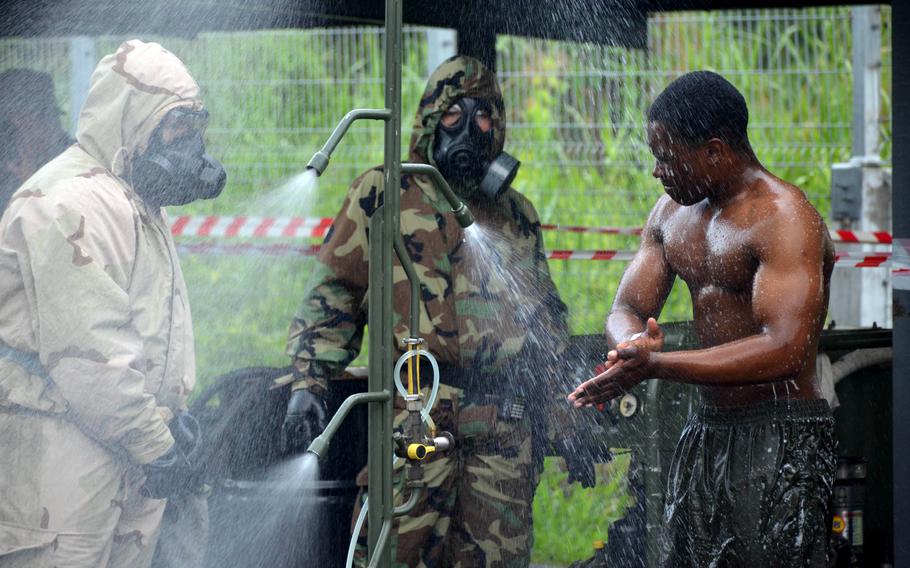
A U.S. Marine, left, who specializes in chemical, biological, radiological and nuclear defense, leads decontamination training during the Cobra Gold exercise in Rayong, Thailand, on March 3, 2024. (Alex Wilson/Stars and Stripes)
RAYONG, Thailand — Soldiers in protective gear breathed steadily through respirators outside a Thai airport hangar, where they prepared on Sunday to screen a group of volunteers for radiation during a simulated evacuation.
Despite their imposing appearance, the soldiers patiently processed a group of about 50 role players from Indonesia, Japan, Malaysia, Thailand and the United States.
The drill was one piece of Cobra Gold, the largest military exercise in mainland Southeast Asia, according to the Army.
The annual drills brought 4,500 U.S. service members from the four branches together with troops from Thailand, the host nation, and 30 other countries, including Indonesia, Japan, Malaysia, Singapore and South Korea.
In the case of any large-scale disaster, the military will almost always play a significant role, said Col. Patrick Blankenship, assistant chief of staff of G9 civil affairs for the Army’s I Corps.
“Cobra Gold and this exercise is a premier time, location and opportunity to exercise these things,” he told Stars and Stripes on Sunday. “I think this reflects the professional character of our militaries being able to work together with other militaries to do this.”
Troops from the U.S., Thailand and Japan, specially trained in chemical, biological, radiological and nuclear defense, or CBRN, led the decontamination drill.
No real radiation was involved, but the teams employed specialized equipment to check for it and after a search for contraband like weapons or drugs directed role players to gender-appropriate showers.
“We were just using soap for this operation, just due to it being a radiation threat, and soapy water can take a lot of radiation particles off of you,” Marine Sgt. Jaden Graham, a CBRN specialist from Boise, Idaho, told Stars and Stripes.
The drill was meant to simulate as close as possible a real-world evacuation and prepare participants for any future disaster. It also provided the troops a chance to learn about their counterparts’ CBRN defense capabilities, said Chief Warrant Officer 2 Nick Weidner, who led the 15th Marine Expeditionary Unit’s CBRN team.
“When we do other partnerships, understanding what capabilities they bring to the table is a large one, and also seeing what they do for their training,” he said ahead of the drill. “It’s their capabilities, their training and figuring out how they communicate – that’s probably been the biggest barrier.”
After the decontamination process, role players were directed to the nearby hangar where they were separated by nationality, had their passports and other documents verified and were screened for medical issues by teams from their respective countries.
The drill remained dynamic throughout the morning. In some cases, role players failed to provide identification; in others, they became irate with their handlers and had to be detained.
By the afternoon, major changes were introduced and threw more wrenches into the plan, including a scenario in which Japanese and Thai aircraft backed out because of bad weather, said Marine 1st Lt. Kaylee MacKenzie, who coordinated the American evacuation.
“Now it’s only U.S. aircraft that has to evacuate the five different countries here,” she said during the drill. “It takes a lot of cross-coordinating, and ultimately that’s been one of the biggest things that I’ve had to really learn and get really good at.”
The decontamination and evacuation process can be used to react to a plethora of situations, Weidner said.
During the wars in Afghanistan and Iraq, damage to weapons production facilities or clandestine chemical labs often required CBRN response teams, he said. On the civilian side, a natural disaster such as a wildfire or earthquake could damage an industrial chemical factory.
The two-week Cobra Gold exercise concludes Thursday.